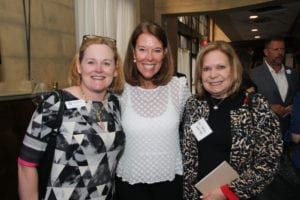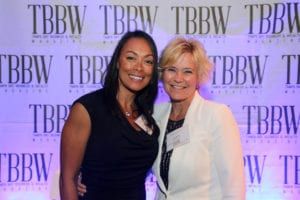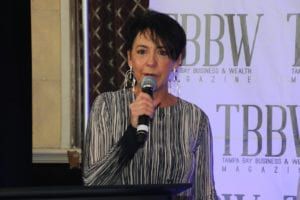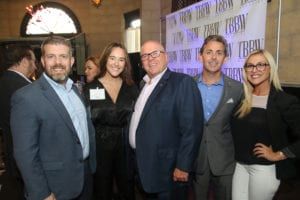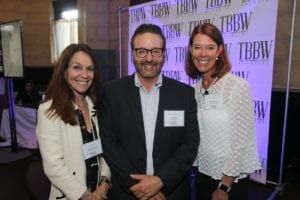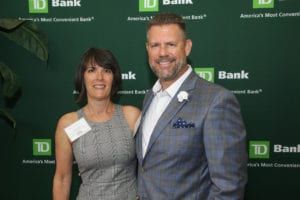‘Women helping other women—that’s what it’s supposed to be about,’ says Bridgette Bello, CEO and publisher of TBBW
United Way Suncoast CEO Suzanne McCormick, leads one of Florida’s largest United Way chapters, ensuring connections are made that cultivate growth, increase community impact and optimize delivery of the organization’s strategic plan to break the cycle of generational poverty.
Sarah Combs is CEO of the University Area Community Development Corp. in Tampa. She joined the organization in 2010, and under her senior leadership the organization has more than tripled the number of children and adults it reaches with education, health, workforce, cultural arts and other programs.
Physician Elana Schrader serves as president of GuideWell Health, and senior vice president and chief medical officer of GuideWell. In this role, she leads the health care delivery business within the GuideWell family of companies. She also is responsible for the development of the overarching clinical strategy for Florida Blue and leading clinical activities, including care management, health promotions and wellness, pharmacy, quality and clinical retail health initiatives.
Bridgette Bello, CEO and publisher of TBBW, interviewed McCormick, Combs and Schrader at Sponsor Mise en Place in Tampa, for this edition of “Women of Influence.” This transcript has been edited for clarity.
One of the things that came up in our discussion a few weeks ago was the #MeToo and #MenToo movement, including transparency and leadership under a microscope these days. Has it has affected your leadership style and decisions you make? Answer and include what you do at your organization, starting with Dr. Schrader.
Schrader: I work for GuideWell, which is the parent company of Florida Blue. Have you heard of GuideWell? [‘No’s from the audience.] Well, let me just take a short moment to explain to you what that is. GuideWell is the parent company of Florida Blue, which is the health insurance arm of that organization.
We basically restructured our enterprise about six or seven years ago, in order to have more leverage outside of the state of Florida. We are now doing business in all 50 states, with one or another of our five or six subsidiaries or business units. I’m the chief medical officer of that enterprise. I’m also the president of one of the subsidiaries called GuideWell Health. GuideWell Health is a structure that houses our own delivery system assets or delivery system clinics or other entities that we have joint ventures with. It’s a relatively new job for me. I took that on last June, which I think is a good segue to what that means to leadership and the like.
I really had no idea what I was doing when I first got that job, many of you know what that feels like, and that first 60-90 days, when you’re really just faking it until you make it. Well, it’s been about six months and I’m still doing that. [Audience laughter.]
In all truth, it’s a beautiful circle for me in terms of how I started in my career, at what was Blue Cross Blue Shield of Florida, and where I am now. When I started, I had been a physician in practice and was very committed when I was offered the job at Blue Cross, to bridge the gap between payers and the provider community.
Very soon after I took that role, which was about 20 years ago, I saw, unfortunately, the impossibility of it, which is not a lesson you should take home today.
A few years into beginning my position there, I left the clinical track and I, for the past 15-20 years, just focused on the business aspects of the company. I led Six Sigma, I did financial planning and strategy, I ran a product area and designed and managed many of the products in our market today, and, about three years ago, I was asked to be the CMO. I thought they meant the chief marketing officer, so I said, “Sure!” [Laughter.] Then I realized they meant a chief medical officer which meant, for me, going back to where I had started, which was kind of jarring, but let me say this: The timing was right and we really are bridging that gap as we sit here today.
McCormick: I have the privilege of serving as the CEO of United Way Suncoast. We say our mission is to fight for the education and financial stability of every person in our community. In particular, we focus on families in our community who are working really, really hard but they’re still not able to take care of their families.
One of the things that really drew me to this community was the diversity here. I was living in the whitest state in the nation and I have two kids, and I wanted my kids to grow up in a community that looks like the rest of America. That’s one of my favorite things about living in Tampa.
When we were talking about the questions for tonight Bridgette referenced the #MeToo #MenToo movement, and I’m still not sure what the #MenToo movement is, but what I do know is, for me, the whole conversation around “me too” or “men too” is around transparency in leadership. I think more than ever, anyone who’s in a leadership position that does not think you’re living under a microscope is naive.
Every day when I’m out in the community, no matter if I’m in Publix in my yoga pants and baseball hat, I still represent the [organization’s] brand.
Combs: I’m the CEO of the university area’s CDC and, no, we’re not the disease control center. We are a community development corporation focused on improving the university area. For those of you who might not be familiar I’m going to use a term that I hate to use—when I use it, you’ll know what I’m talking about. It’s the area formerly known as Suitcase City and we plan to have a suitcase-burning party once we get those statistics up.
We’re building a 70-acre park in the heart of the community, focusing on workforce and employment, self-sufficiency programs, sports programs, community gardens and infrastructure improvements.
I’m a farmer’s daughter from Colorado, and the one thing my father taught me—and this leads into the #MeToo and transparency-in-leadership question—is you have to “figure it out.” When I was about 12 years old, my dad threw me the keys to a tractor, and he said, “Figure it out.” I think that’s so important in leadership because sometimes you just have to figure it out. And if you don’t know what you’re doing, you’ve got to figure it out, and you have to fake it until you make it. With my staff, I’m OK to be open, honest and transparent and to show where I’m vulnerable. I think it’s important for us as women, specifically, to be open about that and to say sometimes “we don’t know what we’re doing, but you know what? We’re sure as heck going to try and we’re going to figure out the solution.” It’s OK to ask for help sometimes.
When we were on the phone, we talked about being women leaders as opposed to being thought of as just leaders, and what the differences are. Suzanne, I’m going to ask you to answer that first and we’ll go from there.
McCormick: I was more vocal on the phone than the others. I think of myself as a leader more than I think of myself as a woman leader. I just want to be seen as a great leader. The fact that I’m a woman and I get to be a mom, which is really special in that leadership journey, does make it unique. I just always focused on being the best leader. And I seldom think about being a woman leader. And maybe that’s because I’ve had as many amazing male mentors as I have female mentors.
It does raise a second question. When we’re direct as women leaders, there’s a word that is often used to describe us that doesn’t happen to men, and they deliver the same message with the same intonations. Talk about that.
Schrader: I agree, right? I think of myself as a leader, but I also know I’m a woman, but there are differences and some of them happen to be biological. In fact, studies have been done that show that people’s reaction to women in leadership roles when they behave in a way that is agentic, like agents, or when they act like the boss, or when they are assertive, they are not received well. And studies have shown that there are fewer promotions among women who exhibit those behaviors, then there are men who are promoted with those same behaviors. There is definitely something that is ingrained in our audience that says we expect certain things of women and something else of men.
McCormick: I remember a particular conversation I had with one of my colleagues. He leads the United Way in Chicago. I said to him one time, “I wish I could be as direct as you are,” and he said, “You can.” And it was as simple as that.
Combs: I have a term for that and it’s called “HWIC”—”head witch in charge.” I think we need to empower that. You can do anything that a man can do. I think that it’s important as we see our young females growing up that we really empower them, to say it’s OK, and you can achieve all that you want to be and you don’t have to be labeled a cold-hearted person.
I want to talk about mentoring and the importance of it. Some of you actually served as mentors to men, but how much of a role did men play, who mentored us and helped us get to where we are? Sarah, would you talk about your mentoring experiences?
Combs: I am so blessed to have had so many amazing mentors throughout my career and I’ve been with the organization for nearly 10 years. I didn’t start in the CEO role. I had to climb, and scrape and claw my way to the position that I’m in and I had three children during this time. I think about how important those mentors were.
Having those mentors was so incredibly important for the growth and the guidance and encouragement of “you can do it.” Don’t let the naysayers continue to pull you down.
I think of three specific mentors that helped me just in my career with the University Area CDC and two were men, one was a woman. Two of them were minorities. There are these people that stand out in your life and really help change your thought process and really build you up.
If you haven’t been on the opposite side and been a mentor to someone, I highly encourage you to do so, because you’ll change a person’s life.
McCormick: I found myself in an informal mentoring role with a guy on my team. He also happens to be a reservist in the Navy. This is the first time he’s ever worked in a nonprofit [organization]. It’s been a really interesting relationship and experience for me because, when I think back about it, I say, “Oh, I’m a leader, not a woman leader.” I do sometimes find myself counseling or coaching him and it does come from the place of, “You need to be a better listener and you need to go a little slower and you need to appreciate that there’s a lot of stakeholders here and we’re not going to move as quickly as you may have been used to.”♦
About Women of Influence
TBBW’s “Women of Influence” series is an exclusive, invitation-only, monthly event that brings together some of the Tampa Bay area’s top business leaders to meet and mingle.
The “Women of the Influence” series is quarterly, sponsored by TD Bank.
The event begins with a cocktail reception for about 120 guests, followed by a live interview of Bay area C-level executives who provide insight into their personal lives, careers and views on issues affecting the business community. The interview is conducted by Bridgette Bello, TBBW’s CEO and publisher.
Partnering with TBBW on this event provides an opportunity to network with the area’s business elite, generate new business opportunities, and increase brand awareness.
For information about event sponsorship opportunities, email Jason Baker at [email protected]..

